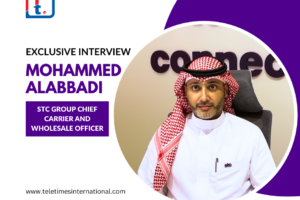 “We will invest USD 1.12 billion in the Pakistani market between 2011 and 2016”, declares Walid Irshaid, PTCL President
“We will invest USD 1.12 billion in the Pakistani market between 2011 and 2016”, declares Walid Irshaid, PTCL President
From a wholly government-owned public sector organisation to one being led by professional, private management: how has the transition been for PTCL?
One has to understand that before PTCL’s privatisation, it was a state-run company; it had a monopoly in key telecom segments; and it was perceived as “the telephone company of Pakistan”. This was the case for nearly sixty years until the year 2005-06 when PTCL was privatised and Emirates Telecom bought the strategic share.
When Etisalat took over the management, we started a “transformation” within PTCL to make it “THE telecom company of Pakistan”, not the remaining “telephone company of Pakistan”. The transformation process was very comprehensive, touching our people, our networks, our services and our revenues.
There were serious challenges for us from the beginning. One, PTCL was hugely over-staffed when it was privatised. Two, most of its services originated from the “Voice” business on fixed lines. We somehow solved the problem of over-staffing in an amicable, respectable and professional way. We were able to reduce our headcount from 64,000 people to just above 30,000. We imparted huge training into our employees and worked on changing the bureaucratic culture to become customer-centric. We said, look, we cannot just sit in offices and customer cannot line up for us. Now we have to go to their doors.
On the revenue side, we realised that we needed to diversify our revenue streams, and not become reliant on “Voice” alone. We wanted to become the “Integrated Telecom Company” of Pakistan. Towards that end, we have made efforts to make our customers aware that they we can offer them much more on the same fixed lines. We’re offering double play (voice and broadband), and we have started offering triple play, too (voice, broadband and TV). Besides this, are becoming more focused towards enterprise solutions for our corporate customers.
If I call last five years as “transformational”, the coming five years are going to be the years of “consolidation”.
How did the market behave in last five years, and how did it impact PTCL?
Interestingly, just before privatisation, two things happened around 2004-05. One, the government of Pakistan decided to liberalise the telecommunication sector. This opened what I call the floodgates of competition, whereby more than 200 telecom licenses were issued between 2004 and 2006 in different telecom segments. Today there are some forty active operators on the ground, all competing for the market.
Two, amid wire-line substitution to the wireless and declining voice tariffs; we were in a critical position as our revenues were predominantly voice-based. Overseas call terminating in Pakistan used to constitute roughly a quarter of our revenues. We used to charge ten cents, and today the tariff has reduced to one cent. Foreign operators are now expecting us to terminate their calls for free here: a result of having 14 LDI operators making a mess of this business. So, it was a completely changed scenario for us.
What is the revenue mix at PTCL today?
Today, voice is just one of the eight revenue streams for PTCL, and contributes roughly over 40 percent to our revenues. This is in sharp contrast to five years ago when it used to be over 90 percent of total revenues. The second-largest revenue contributor is broadband, which provided for 20 percent of our revenues. The corporate enterprise solution unit is contributing roughly eight to ten percent to the revenues, and it is the fastest growing revenue stream today. It is targeting businesses, e.g. the banking sector, where most of the banks in Pakistan are relying on us for online banking, ATMs, connectivity, etc.
We soon realised we needed “home-grown” revenues, and could no more rely on international incoming calls. Diversifying our revenue streams was essential, and we are making great progress in this regard.
Your major revenue source is still voice. Within that, how has the completion from mobile network operators affected your share?
Competition has affected us in two ways. First, the rates are not like before, even for domestic calls. The voice tariffs in Pakistan are one of the lowest in the world. Although subscriptions have declined, the volume of minutes handled by PTCL today is much higher than it was five years ago. Without too many mobile network operators, our growth in volumes would perhaps have been ten times more. The text messaging service on mobiles also took a lot of our business. If Pakistanis are generating one billion minutes in a day, PTCL is not taking 90 percent of it like it once used to.
How is the Ufone, PTCL’s mobile telephony subsidiary, been doing lately?
Ufone has been in a relatively good shape. It has been around for many years. I always feel that they have done an excellent job. First, by not being in the rut, they are still being a profitable company. Two, they have really managed to secure good position in what I call a “suicidal” market. Providing service is something, maintaining the quality of service is something else.
How does the Etisalat group value the Pakistani market?
As group CEO in Pakistan, I want to tell you that we are here to create a profitable, world class telecom company. This is not a requirement or a slogan. This is a mandate from our investors and shareholders. The Etisalat group values this investment; they are very committed; they are not here for the short-term gain; they’re not here for hit and run; they’re here for the long-term. Pakistani market is of the highest priority for the group.
But Etisalat paid a price twice as much as other bidders for buying the management stake in PTCL. What did Etisalat see in the company (or in the market) which others did not in 2006?
The Etisalat group does not regret its decision. The beauty lies in the eyes of the beholder, they say. We’re very committed to this market which we believe is still severely under-provided in terms of ICT. Pakistan is sixth most populous country of the world, with 180 million people and a youth bulge. Every year, at least 5 to 10 million become potential broadband users.
When we bought this strategic share in PTCL, we didn’t look at today and tomorrow. We looked at what would this market be like in 5 to 10 years. Today, there are more than 15 million Facebook users in Pakistan. We’ve seen that average download in broadband in Pakistan is 25GB. Contrast this with the average global “unlimited” download of only 5GB. So the future for us is the promise.
There are issues with the $800 million in outstanding payments for the over three years now.
This has to do with fulfilling the commitment in the original contract between the Government of Pakistan and Etisalat group. The issue is that of the transfer of real estate belonging to the PTCL Company. Once the transfer of the properties is concluded, this issue will be resolved. The bilateral, brotherly, cordial relations between Pakistan and UAE are there, and nobody can undermine that. Yet Etisalat works on a commercial basis, and wants results. So things have to be viewed in the right perspective.
It has been reported that more than 90 percent of the properties have been transferred in PTCL’s name, so why not deduct the value of remaining of remaining properties and settle the outstanding payments?
This issue is not being contested by the PTCL Company. It’s being discussed between GOP and Etisalat themselves. The issue, I personally believe, is not impossible to resolve. It’s a contractual commitment, in which there are milestones, and the last one has to be fulfilled. We’re very close to it. Around 95 percent of the transfer has been made. There are still some properties that need to be transferred, and this transfer is not to Etisalat or anybody else, it is to the PTCL Company.
The value of the remaining properties is being discussed between the Ministry of Privatisation and Etisalat. There are actively engaged on this.
Do you have plans to divest some of the properties and invest the funds in core business?
Not really, no! But all options are open for us, and I don’t rule out selling some of the real estate. But first and foremost, the two parties have to settle the issue.
The broadband penetration is still abysmally low in Pakistan. Any plans for the broadband segment?
Going forward, in the coming five years (including the running year, uptil June 30, 2016), the PTCL group has made a commitment to invest a hundred billion rupees in this market. This is not a figure on the table; this represents a commitment for concise, clear-cut and focussed investment.
Where would the investment go?
We have a clear-cut, concise business plan to provide the highest quality broadband for upto 5 million outlets, households, and businesses. Each one of those 5 million customers will be guaranteed a minimum of 10MB broadband speed. It’s a one billion dollar plus investment. We are not contemplating and thinking. Even as we speak, the wheels are already rolling.
Today, the 1MB users want more speed and download. You’ll be shocked to know that folks in rural areas, who have bare access to basic facilities, are savvy internet users. And that is why I do not underestimate the potential of broadband. Otherwise, I will be underestimating my company’s potential.
We have to bring a different value for our customers. Voice is dirt-cheap, and a relic of the past! We want to go to the households, be a part of their lifestyles, and make sure that we provide them the services they want and when they want: be it the TV channels or broadband or basic voice. This is how I foresee the market. We’ll provide a minimum, guaranteed 10MB bandwidth, reliable service and highest quality, so that our customers are satisfied. It’ll be a plug and play solution.
What will be the financing arrangement for the Rs100 billion which PTCL is planning to invest up till June 2016?
There is no worry about how to secure that investment. It is not something that we cannot arrange. It could be a debt to equity combination.
How do you see your company margins in 2016?
Promising! Our bargain chips are placed on better revenue figures in the future. By FY16, I am optimistic that our revenues would be double the FY11 figures. Going forward, I foresee PTCL in a much better and sound financial position. Of course, we have to ensure that we deliver, as the investment will not come for free. We have to improve our revenues and bring them to a higher level. It is only by trying to diversifying more and ensuring that when we go to the customer, we deliver a reliable and high quality experience, consisting of all the triple play services: video, internet and voice.
There are already five active players in the mobile telephony market, and there is a talk of a potentially sixth active participant.
As group CEO, how long do you think such a competitive structure can sustain itself?
This is not conducive to the operators and the country to have another active MNO. There is no need for further bleeding. Since the auction is also open for existing MNOs, there is a chance that one of the existing operators acquires this cellular license and gets more frequency spectrum. The five operators can also go and collectively buy this spectrum to prevent the sixth operator from entering the market.
I do not expect to see five telecom operators in the medium to long term. If the five can consolidate into three, it would be better for everyone.
Do you think Pakistani market is ready for the third-generation (3G) network technology? What are your plans regarding the 3G technology?
The deployment of infrastructure for 3G operations is much more expensive as it is more about transporting data than voice. A lot of investment would be required from the sponsors of the 3G operators. It is going to be really difficult for the 2G “leftover” operators in the post-3G environment, because high revenue-generating subscribers would switch over to 3G networks. Voice services would have even lower ARPUs later on, so it will be difficult for 2G operators to survive for long in a market like Pakistan. There will be a clear case for consolidation.
So, as the group CEO, I am reasonably confident that Ufone would be one of the three 3G licensees. Ufone is going to be a strong contender for the 3G spectrum in Pakistan and will fight to win!
There is a clear case for mergers and acquisitions in the local telecom sector. Would you be willing to shop for one?
I have told you that the five coming years would be the years of consolidation, following the prior five years of transformation. Now we are going ahead with our plans, and reliance would be on indigenous, home-grown revenues. So far, we have been focusing on the organic growth. However, I don’t rule out any inorganic growth if need be at any point in time.
The “branchless banking” market in Pakistan has revealed its potential in the last two years. While other major MNOs are seriously looking at the market, why is there reluctance from Ufone?
I think that Ufone is not going to be left out. This area is being discussed at the group level at Etisalat, for bringing in more synergies between various group entities vis-à-vis mobile money transfer, mobile banking, and payment systems. The remittance flow from UAE to Pakistan is the second-largest after KSA, so that is just one huge opportunity.
Who would be in a better position than Etisalat and Ufone to tap into this market?
We must admit that we are late, but we are not out! The market is there. We’re looking at both money transfers and payments.
Telecommunication is among the most-heavily taxed sectors in Pakistan. How does such an exorbitant taxation regime impact your business model? Are you taking up this issue with relevant authorities?
One has to keep the whole economic situation of Pakistan in mind: the country is going through a tough period of fiscal crunch. It is really up to the government to decide what ecosystem they want to provide to the investors and businesses. I don’t want to exaggerate the taxation issue. What bothers me the most is not taxation! It’s the power outages that present the real challenge to PTCL more than anything else. Running the operations for eighteen hours a day on fuel is a logistical and security nightmare. And it’s on a continuous basis. Not just that, the equipment wares out, batteries have to be replaced every six months, and fire incidents happen in the diesel generators. It is really difficult to maintain the quality of service 99.9 out of 100 instances in such an environment. So, if the government keeps this taxation regime but provides a constant, certain supply of electricity, the business would be in far better position.
Why not share the infrastructure?
The idea of a “Tower Holding Co.” is still relevant. On the facility sharing, PTA does not stop. I foresee there will be more sharing among MNOs in the future. It is just not feasible to have 5 towers within a small distance of 10 to 20 kilometers. On a side note, as a telecom professional I find this really strange that MNOs have not allowed national roaming among themselves. Under these distressful conditions, they should do that. That can greatly reduce the running costs and environmental issues. The regulator should force national roaming as a regime.
USF has been around for the last four years during which it has contracted and subsidised a number of projects for ICT development in the un-served and under-served areas of Pakistan. How much has the telecommunication sector benefitted (so far) from the USF-funded projects, keeping in view their contributions to the funds?
USF has done a good job in Pakistan. It has slowed down a little bit over last one year. I am hoping that USF will be back on its feet as a new management has now taken charge. PTCL has been an active participant in USF projects in various ICT areas.











